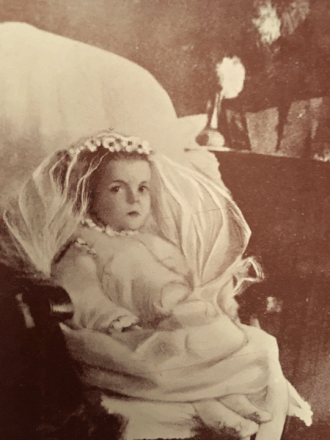Every good gift
A portrait of Nellie Organ (Little Nellie of Holy God)
Our eldest daughter Sonya is six years old, and she recently made her First Communion (praise God). Our middle child Rebecca is four, and we recently made the embarrassingly rookie-parent move of reading her a picture book about Little Nellie of Holy God [1].
In case you’re not familiar with Little Nellie (I wasn’t either, till about a week ago), she was a turn-of-the-century Irish girl who took First Communion at the age of four, when it was customary for children to wait until the age of twelve. She was, in fact, the inspiration for Pope St. Pius X to alter that particular custom. When our own four-year-old heard of this, she immediately (and, in hindsight, quite foreseeably) declared that, being the same age as Little Nellie, she too must be ready for the Eucharist.
But the subject of the picture book we received as a First Communion gift was the sort of exception that proves a rule. Little Nellie was granted a dispensation for two reasons: First, she possessed a miraculous sensitivity to the Real Presence. She always knew, while lying in bed (she was an invalid), the exact moment when the Blessed Sacrament was being taken from the Tabernacle. “Holy God is not locked up anymore!” she would say. And secondly—well—she was an invalid. She received Our Lord at the age of four years and three months, and died at the age of four years and five months.
Rebecca’s a great kid. She has a wonderful devotion to St. Joan of Arc, and a beautiful tenderness for Our Lord’s wounded feet on the crucifix. We suspect, however, that her desire to follow her older sister in receiving the Host is inspired less by an understanding of what that means, and more by the pretty white dress and crown she would get to wear—to say nothing of all the cake.
It got me thinking, though. When I was little, my brothers and I were excited when Gram and Grampy came to visit because they always brought donuts. Of course, also, we loved Gram and Grampy, but we were children; that love was a vast, quiet background that only a sudden calamitous absence would have brought into focus. Our immediate concern when they pulled into the driveway was for the big white box with the pink and orange letters: the chocolates, the frosteds, the Boston cremes, and the weird make-up-the-dozen flavors that no one ever ate. We weren’t old enough to distinguish meaningfully between the joy of our grandparents and the joy of what they gave us.
Owen Barfield of the Inklings speaks of the “ancient unities” of prehistoric culture: the lack of intellectual distinction between, for example, numinous spirit and physical wind—the trace of which can still be seen today in the Greek word pneuma which, depending on context, can mean either of those things. So too, on the individual level, an infant has no context for sorting sight from sound, or dream from reality: all sensory input is a blobby experiential gestalt, until we progressively learn to compartmentalize. Likewise, our daughter Rebecca’s first concern may be for the pretty dress, but that’s only because she can’t yet distinguish the celebration from the cause of the celebration.
Mind you, I’m not arguing that she should be allowed to receive just yet. I’m just saying that, as adults, we tend to project our own mode of valuation onto children—where, by definition, it can’t exist—and thus muddy our perception of their motives. Our kids love Christmas because of presents-and-the-Incarnation, not because of presents and the Incarnation. Even as grownups, we love God because He is the Good, the True, and the Beautiful—and, inextricably, because “Every good gift and every perfect gift is from Above” (James 1:17). As our eldest daughter Sonya recently learned, it’s not even theoretically possible to separate the love from the gifts: without the appearances of bread and wine, we could not receive the Body, Blood, Soul, and Divinity of Our Lord Jesus Christ.


